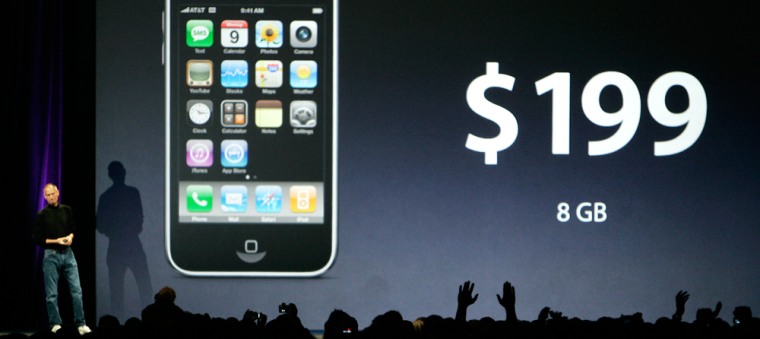The iPhone will soon be $200 cheaper and come with satellite navigation and faster Internet access, but it will be pricier to own because monthly service charges are rising.
Apple Inc. revealed Monday that it has scrapped its premium pricing plan for the iPhone and unveiled an upgraded model that works over faster wireless networks, addressing key criticisms about the device that have hurt the company's foray into the cell phone industry.
The iPhone's lowest price — for an 8-gigabyte version with the major new features — will fall to $199 when new models go on sale July 11, the Cupertino-based company revealed Monday. A 16 gigabyte model is to sell for $299.
The company plans to make up the difference in revenue with sales volume and with subsidies that wireless carriers will now pay for the right to carry the gadget.
In changing the pricing arrangements, Apple is pulling out of some of its revenue-sharing arrangements with wireless carriers, a move that frees the carriers to charge higher prices for the service.
Apple shares fell $4.03, or 2.2 percent, to close Monday at $181.61 on the news, a sign that some investors were hoping for more and others were taking their profits after a four-month run-up in Apple's stock price, which leaped from $120 in March to nearly $190 this month.
The new iPhones are designed to work over so-called 3G, or third-generation, wireless networks and have global-positioning technology built in.
They'll roll out initially in 22 countries. Apple has inked deals for wireless carriers in a total of 70 countries to carry the new iPhone.
Analysts have said Apple needed to slash the iPhone's price and upgrade it to the faster networks to hit the company's target of selling 10 million iPhones by the end of 2008.
The iPhone is in increasingly direct competition with Research in Motion Ltd.'s BlackBerry and Palm Inc.' s Treo smart phones, and the new iPhones' support of Microsoft Corp.'s Exchange software will help Apple steal market share within corporations.
Apple Chief Executive Steve Jobs showed off the new models of the iPhone and about a dozen new applications for the device at Apple's Worldwide Developers Conference in San Francisco.
Those applications range from video games that use the iPhone's motion-sensing technology to guide characters, tools for medical students to study anatomy and a program that allows iPhone users to look on a map and see which of their cell-phone-carrying friends are nearby.
Other programs include a way to receive real-time video highlights and game stats from MLB.com and create a news feed based on your location and submit news tips through a program created by The Associated Press.
Jobs said the Cupertino-based company has sold 6 million iPhones since the first model was launched nearly a year ago and 700,000 since March. That points to a steady slowdown in sales starting in the fourth quarter last year as customers waited for a 3G version.
Apple's strategy of collecting revenue from carriers for iPhone sales and wireless service also is changing.
AT&T Inc., the exclusive U.S. carrier for the phone, said service for the phone will start at $39.99 per month, plus $30 for unlimited data. That works out to a $10 increase from the cheapest plan for the first-generation iPhone.
AT&T also warned that it will take an earnings hit due to the pricing because its subsidies produced the iPhone price cut — not a reduction from Apple.
Apple said in a regulatory filing that under most of its new carrier agreements, it will not receive a share of subscribers' monthly service fees as it has under contracts for the first-generation iPhone.
Apple said the 3G iPhone downloads data twice as fast the old one. The company's participation in the cell-phone market has been hurt by complaints about the year-old iPhone's data download speeds, which can make simple tasks like sending pictures over e-mail or downloading Internet videos painfully slow.
Jobs said the chips needed for running on the faster networks when the iPhone first came out sapped too much battery life and were too bulky, so Apple waited to improve the device until better chip technology emerged that could fit the iPhone's slim design.
The addition of global-positioning technology improves the iPhone's accuracy in locating users. Current versions use a combination of cell-phone towers and Wi-Fi locations to help users figure out where they are.
The 1.73 million iPhones Apple sold in the first three month this year gave it a 5.3 percent share of the worldwide smart-phone market, according to research firm Gartner. Apple has been adding overseas markets gradually with carrier deals.
